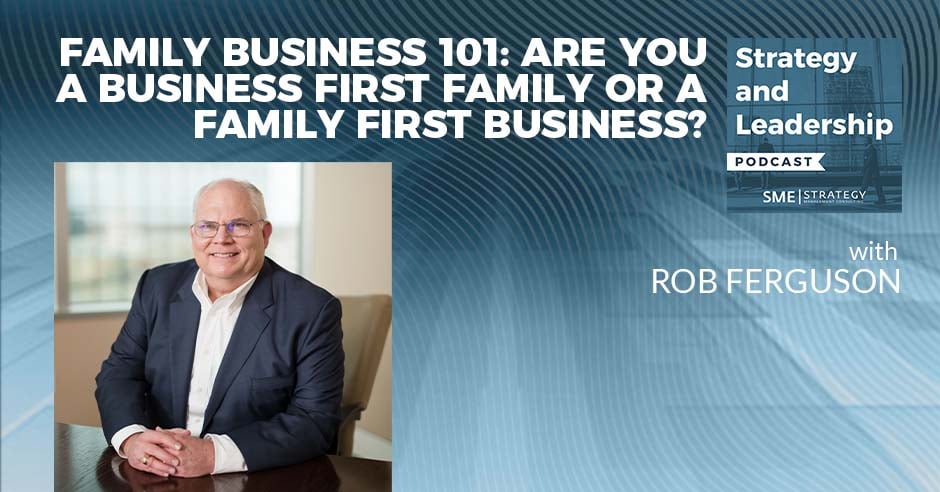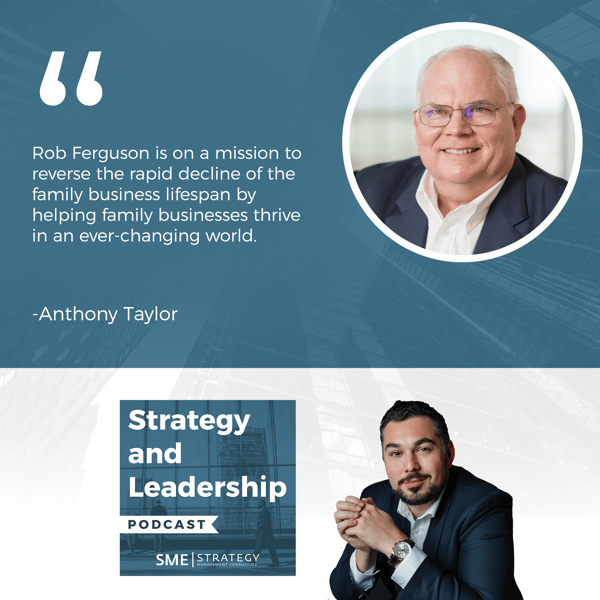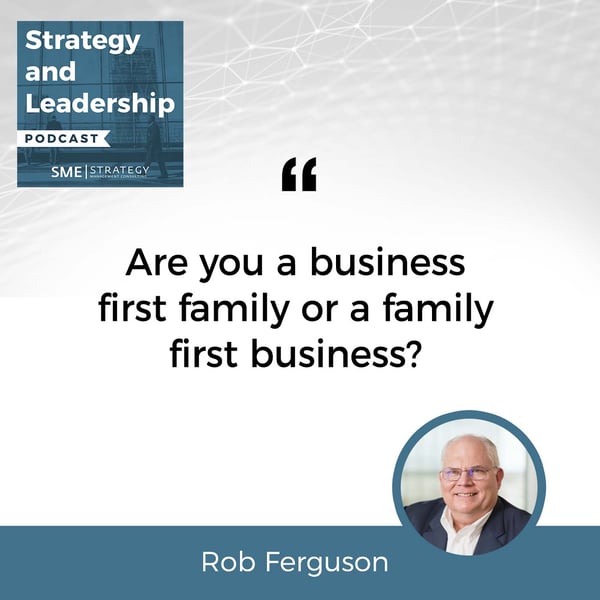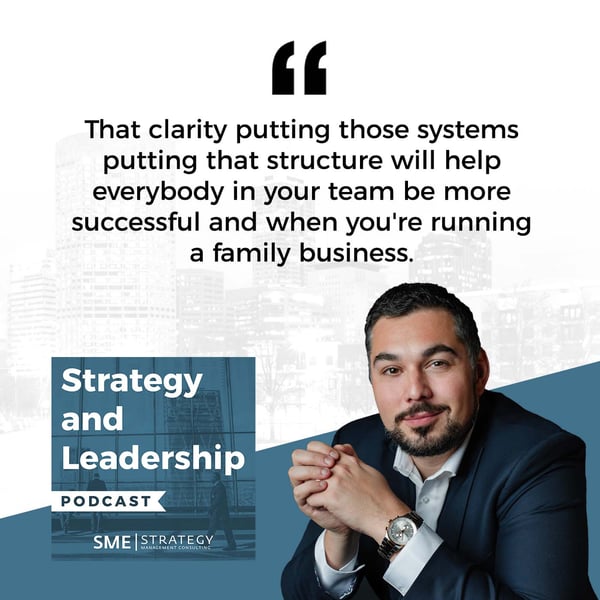Family Business 101: Are You A Business First Family Or A Family First Business? With Rob Ferguson

Do you run a family business? Have you ever pondered on whether you’re running a family-first business or a business-first family? It’s time we explore this question, and today’s guest is just the person to talk about it. Rob Ferguson has been a trusted advisor to family businesses since 2010. He takes his decade-plus experience and wisdom to the show to discuss how family business owners can ensure that they’re running a growing and profitable business without losing sight of the things that truly matter. Want more? Tune in!
Want to continue the conversation with other leaders around the world? Join our Strategy and Leadership community.
https://strategy-and-leadership.mn.co/
► Subscribe to our channel for weekly videos on strategy & leadership: https://www.youtube.com/channel/UCOHLNRrpk3rGUdg7qUQjiog/?sub_confirmation=1
➡️ Looking for a sample agenda for your strategic planning offsite? https://www.smestrategy.net/blog/sample-strategic-planning-agenda
// Connect with us:
► Contact us: https://www.smestrategy.net/contact
► Connect with Anthony on LinkedIn: https://www.linkedin.com/in/anthonyctaylor604/
// About SME STRATEGY CONSULTING:
SME Strategy is a management consulting firm that specializes in helping organizations develop and implement their strategic plans. We work with teams to facilitate conversations about strategic direction and business strategy so that our clients can focus their energy on what will move them forward faster.
► Work with us: Are you looking for someone to facilitate your strategic planning process? https://www.smestrategy.net/strategic-planning-facilitator
► Check out our Strategy & Leadership Podcast: https://open.spotify.com/show/4yND4JKofh64gcvyvcLMqW
► Check out our online course on how to successfully lead your next strategic planning process: https://courses.smestrategy.net/
Listen on Spotify: https://open.spotify.com/episode/6rODCf2TA2gsV6TnWWGzj1?si=6d629a05902a42fc
Listen on Apple Podcasts: https://podcasts.apple.com/ca/podcast/family-business-101-are-you-a-business-first-family/id1202449526?i=1000651880157
---
Watch the episode here
Listen to the podcast here
Family Business 101: Are You A Business First Family Or A Family First Business? With Rob Ferguson
My guest today is Rob Ferguson, who is the Founder and CEO of the Ferguson Alliance. He is a former CEO of the industry and now moved to the consultative side to support organizations moving forward. Rob, how are you?
I'm doing terrific. Thanks for having me on your show.
It's my pleasure. As our reader might know, and as I told you, typically we don't have consultants on here, but you're not a traditional consultant. You have a deep specialized expertise in helping people, but why don't you tell our readers about who you are and what you do, and I'll ask you some more questions.
I’m happy to do that. I'm a business leader. That was 30 years in a public company, as well as a non-public company then I transitioned from a business leader to now a business advisor, helping other business leaders with the challenges and opportunities that they have running family businesses. I can talk a little bit more about that specifically my background. I grew up in a traditional after-college and a large Fortune 100 company. Went through their management training program. I was very fortunate, at a very young age, I had a great career and great training. I was part of a leverage management buyout group. I’m the youngest guy. I spun that little company out and we grew it and took it publicly. I became CEO of that and then we monetized on that. That was terrific.
It went from $30 million to $400 million in annual revenue and then went into a family business. It was a 100-year-old family business, a very interesting industrial packaging company. The fifth generation was running it at that time. Maybe seventeen cousins were involved. It was a hot mess. My job was to go in there and fix the business, turn it around, and then sell it to the family, which we did. I got that accomplished.

From there I started sitting on various boards for family-owned businesses. They would hire guys like me to go sit on operating company boards and report back to the family office how they were performing. That's where I fell in love with family businesses. I thought I'd be an institutional guy my whole career. I realized what family businesses mean to the global economy and here in the United States.
They're very significant. They drove 72% of employment a few years ago. That's a big number. They drive philanthropy and innovation. The other thing I've learned is that family businesses are a lot more resilient than non-family businesses. In fact, what got me into this advisory is I wanted to do something to help what I think is a significant problem in business nowadays. That's the lifespan of family businesses declining rapidly.
Family businesses are a lot more resilient than non-family businesses. However, the lifespan of family businesses is declining rapidly.
In the 1950s, the average lifespan of a business was 60 years. Back in the 1950s when they were taking statistics and demographics of businesses, they didn't separate between family and non-family business. That's 60 years for all business. I can tell you in 2022, the average lifespan of a family owned business was 24 years. It's gone from 60 to 24. To me, that's an alarming trend. For your benchmarking information S&P 500 companies, ' average lifespans are 15 years. That's what we believe is the real problem. That's why we exist in trying to help give practical strategies to help reverse that lifespan trend.
The Challenges Of A Family Business
You have the deep experience that it both leading it and then supporting folks then I'll say, not the caveat, but the context that our readers either might be leading family businesses or they might be in the family businesses as an advisor myself, I hear from a lot of people that are in family businesses saying, “I've got this family business where it's the brother or the dad, the son and all those go.” Can you maybe tell us A) What are some of the nuances or challenges that you see with some family businesses? The next set of questions will be like what are some of the best practices to support those businesses in supporting their longevity? What are some of the nuances and some of the key characteristics or challenges that you see in family businesses?
As you know, because you work with businesses every day as well, business is challenging whether you're family or non-family. The nuance in a family business is you have all of the challenges of a business, but then you have the family. You have all of the historical relationships of family that are present in your business challenges. You might be the CEO of the business, but your aunt is the CFO. That's that dynamic. What we find is that we have to be able to get family businesses to understand what the greater good is of the business. We do that by asking a simple question that's very difficult to answer. That question is, “Are you a family-first business or are you a business-first family?”

A lot of times we'll get a quick reaction. It's more values-based. It might be, “We're God-family business,” or something like that, “More valued. Centered.” We'll say, “No. What is the most senior priority? How are you going to operate, manage, and make decisions around that declaration?” Once we get the family to answer the question, “Are you a family-first business or a business-first family?” but get them to understand the differences between those and then make a choice, then we can go forward. There's no good or bad answer, no right or wrong.
Do you mind sharing the distinction between the two?
Sure. The family-first business is going to be present in a lot of smaller businesses that you come across every day. It might be your dry cleaners or your local restaurant. If you think about it, it can be larger businesses as well. When you look into the business, a lot of the family members are employed in the business and maybe those family members are not the most qualified, but it's a way for them to get compensated. The family-first business is there for the benefit of the family, however,, that's defined. In a business first-family business, it's there for the benefit of the business. The business comes first. The business priorities come first.
I don't know if you have a preference of working between one or the other. It's the motivators and drivers. When you were explaining the Family-first business, it occurs more as like a lifestyle, whereas the business first family business is around supporting growth, potentially supporting impact profits. Is that a fair assertion?
You hit the nail right on the head squarely. Our mission is to help these family businesses live longer. We know that business-first families, those businesses do can and will live longer because of the reasons you listed. Whereas a lifestyle business or a family-first business, it's going to hit their ceiling. It's only going to live as long as that family is there typically what we see happening is the family gets big, and the business can't keep up feeding the bigger family as multiple generations come in. It can be done, but it's very challenging. Our preference is working with business-first families because that lines nicely with our mission to help family businesses live longer.
Business-first families tend to live longer. A lifestyle business or a family-first business is only going to live as long as that family is there.
The Business-First Family And Longevity
Let's follow along with the business-first families. You talked about the longevity in there and the fact that your family doesn't go away in 9:00 to 5:00 and unfortunately you have to make decisions and sometimes tough decisions throughout that. Maybe 1, 2 or 3 best practices for leaders in these family businesses and the business-first families to be successful in navigating the challenges of working with family?
The first big one I believe is making that decision what we said and everybody has to consensually agree to that. This has got to be a hundred percent agreement. Secondly, establishing, I'm going to call it, a family constitution.
A family constitution is distinct from a business constitution.
A business family constitution. Thank you. It is how is the family going to work and operate inside the business. It's in addition to the normal corporate documents you'd see like bylaws or management agreements. In that family business constitution, that's where you make a lot of decisions around, “How are we going to hire family members? How do we think about non-blood family members in the business?” We try to get that family business constitution designed for 2 or 3 generations forward. It'll live on. You don't work it for the current sitting generation. You work 2 or 3 generations downstream.
That seems to help get alignment and it helps separate out the family and the business to be the second thing that we would highly recommend. The third is in your area is getting clarity and full agreement on what's the purpose of this business. Where are we going to take it long-term? How are we going to get there? That gets into the whole strategy development of the business. To me, those are the three big initiatives to have a family business become very successful and live from one generation to the next.
What I understand from that, and I mean it's all three of those because about making important and impactful decisions considering the future. They're not things that happen fly by night. You have to sit and intentionally have the conversation, “Who are we? What are our rules or regulations for managing this as an entity so that it can be prosperous and successful now and in the future?” Lastly, “What does that future look like for us?” You have the intricacies of family and individual growth within a business which impact that.
Let me ask a slightly different question. We talked about longevity. You talked about moving the business forward. What do you recommend to families that are considering succession planning, the irony or not irony? I was talking to somebody and she was saying, “Our company has a known nepotism rule so I can't hire my son.” In a lot of cases, there are those 2nd or 3rd generations much fewer in 2024. What would you say to AaCEO who was thinking about bringing their son or daughter or cousin or aunt into the business as a means of succession planning? Would you have a couple of recommendations for them to consider?
1) Start early. Start your succession plan as early as possible. 2) Start earlier than what you thought you should be starting. 3) Start early. It's tongue-in-cheek, but the sooner you can start on succession planning, the better. You want the succession plan to be somewhat dynamic. When we do succession planning, we try to have at least 2 or 3 plans that are going at one time. You know this. You're in strategy. The external environment is very dynamic. Things change in business. You have a course or direction that you are headed down, but you have to have some flexibility to deal with the upsets or the opportunities that come along as you're moving forward.
Start your succession plan as early as possible. Start earlier than when you thought you should be starting.
The same thing in succession planning. Maybe you have a family member that's part of the succession plan or a non-family member executive that's part of it and then maybe part of your succession plan is liquidating and exiting by selling to a third party. Start early. It's an iterative process. It's not something that you pin down after three months and you put the plan on your bookshelf. You work it.
Family Business Leadership
Let's say there's a family business owned by a family and then you're talking to a senior leader who is forced to, it's the opportunity to, work within the joys and constraints of a family business. I guess there are two sides to this. What would you say to a CEO who is supporting a leader who has to manage that? How do you talk to, and I don't know if you do any work with folks who are senior leaders in a family business because? It's not always easy to make decisions when there are three of the same last name on the executive team and you have to manage within that. Are there any best practices you'd say to support, not continuity, but effective conflict communication?
The first thing I would say is to make sure that roles and responsibilities are clear and homes for decision-making are understood. What's our default decision-making process around here? Are we autocratic? Are we going to be consensual? Are we going to be democratic? Are we going to be collaborative? What is that? Getting that well-defined, and then, “Who owns this decision around profitability, operations or marketing? Whatever it is, getting that established, we work with our clients and I did this when I was a CEO.
I had 3,500 employees and we ended up doing a simple RACI matrix of responsibilities, and accountabilities, who are you going to collaborate? Who are you going to inform? That tool was very effective for me when I was A CEO then I made sure that that racing matrix aligned to our organization structure and that organization structure aligned to our value chain.
The point is those best practices and businesses apply well here in a family business. They're very necessary to have. The second thing I would do like you do in business is get the compensation aligned. You want to align the compensation to those senior executives. If you're delegating strategic decisions, you're delegating big financial decisions to non-family members that maybe it's a president, not a CEO. You want to make sure that the compensation is aligned to creating shareholder value and that they get rewarded for that.
One thing I would say to the senior executives is and I'm going to come back to a statistic I said earlier, the lifespan of a family business is much longer than S&P 500. Family businesses make decisions slower, but they're better. Their horizon is two decades because it's to the next generation, whereas an S&P 500, a non-family business, it's the next quarter, “We got a quarterly earnings report. Let's make decisions to make that. Now I'm speaking in generalities.” The culture in a family business is a lot more sustainable for non-family member employees and executives than I would say in a non-family business. I've been in both. I've experienced both.
I find that interesting, the driver's decision-making time and recognizing, “If you work in a family business, I don't want to say more relaxed, that's probably not the word, but the pressure external is a lot less when you have to like report to a board or your quarterly earnings or what have you,” then go back to the RACI.
There's a lot of great, what I heard was putting those fundamental business best practices in, we have a lot of them through our strategy implementation programs. I'm sure you do as well. The fundamental for a reason, and if you think about the fundamental, it is the foundation. When you have all of that stuff in place, it creates transparency, certainty, and knowledge and it makes the work, easier for everybody, especially when there's a higher possibility for emotion to get into decision-making and to have other storylines in the organization playing a part.
The whole job of a leader is to keep the organization aligned to where we're going. I use the term internally with our clients called leadership. We turn the noun into a verb. I know it's not proper grammar, but we call it leader shipping, which is bringing the future to the present. That's what the role of a leader is in a family business, as well as non-family, is you've got to be able to keep everybody in between the gutters on the bowling lane. Make sure everybody understands where North is, but given the flexibility to move in between the gutters, but they're still making progress and that leadership role is critical.
Make sure everybody understands where North is to give them the flexibility to move in between the gutters while still making progress.
Where can people get a hold of you? Before I let you answer that, I want to highlight that there's an amazing download on your website. He didn't ask me to say this, but I'm saying it is the prosperity plan about 3/4 down the main page. It's a 30-page white paper on supporting family businesses, building freedom and building legacy. It's high quality. I want to highlight that. Where can people connect with you? Where can they learn more? Where can they get this white paper as we finish up?
You can go to our website at www.Ferguson-Alliance.com. If you go right there, you'll see a lot of information on our front page. We have a section in there called Resources and we have a whole resource of podcasts, webinars and blogs. They're sorted by topics and you can also search by topic keyword there. You can also schedule a call with myself or other advisors. We have our links in there and be happy to talk to anybody. You can email me at Rob@Ferguson-Alliance.com. That's another way to get in touch with us.
Thanks for the time. It's been a pleasure. We appreciate you sharing your perspectives. I know that there's a lot more we could talk about, but I appreciate you sharing a couple of quick tips for our readers.
I enjoyed it. Thank you.
It's my pleasure folks.
---
I'm a consultant. I run a business doing strategic planning with my team. One of the things that we always focus on is about fit, whether you're in the Texas area or a family business, it's important to find a person who understands what you're working on and working with. That has deep subject matter expertise in it. What I like about Robin is when I ask him, “Can you come on the podcast?” Not only is he advising on it and has been for many plus years, but he was the CEO of a very successful family business. There are intricacies to it. Having somebody who understands it is key. That's for you, the reader.

For anybody, put those systems in place, whether you're a family business, whether they're a non-family business, putting that clarity, those systems and that structure will help everybody in your team be more successful. When you're running a family business, there's that dynamism. There are conversations that happen outside of the business that can inform that. By putting more structure in place, if you're going to be a business first, family business, it helps you focus on business first and family next. It's all about helping you, your family, and the people on your team to be more successful.
Rob, thank you for sharing with our readers about how to do that. We appreciate your generosity with your resources. Folks, if you know somebody who is in a business that is run by a family or is running a family business, please share this episode. Help them out and help them add to that many years of legacy that they're building for you. I appreciate you being here. I'll see you next time.
Important Links
About Rob Ferguson
 Rob has been a trusted advisor to family businesses since 2010.
Rob has been a trusted advisor to family businesses since 2010.
Prior to becoming an advisor, Rob had a distinguished career in leadership – including ten years as a CEO at 2 different companies. One was a public company with $300 million in revenue, the other a family business with $100 million in revenue where he successfully managed the restructuring and sale of the company.


